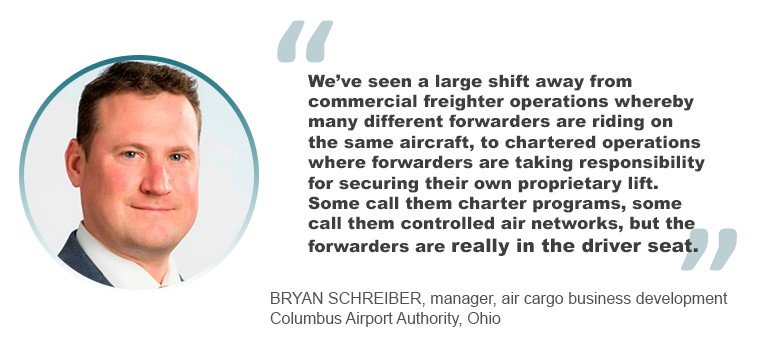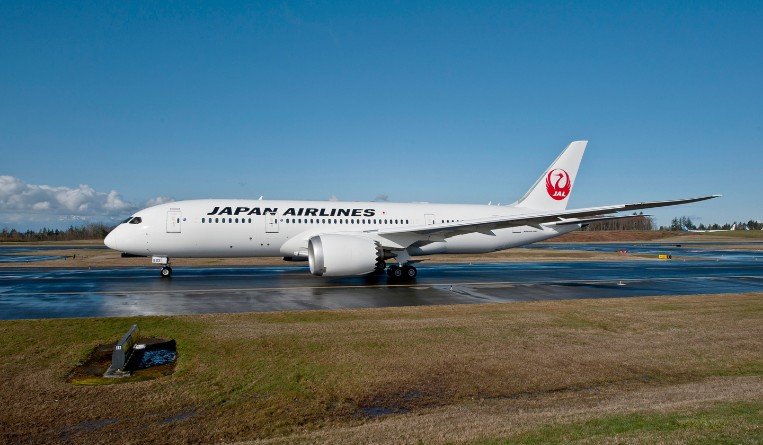In mid-April, CEVA Logistics unveiled two new services in its air freight portfolio – a premium offering for time-critical shipments and a product that offers guaranteed access to capacity.
The latter offering, which is called SkyCapacity, is a response to the tight capacity situation that has seen shippers and forwarders scramble for lift in recent months. CEVA has built up a network of dedicated capacity through a series of arrangements with aircraft operators to run dozens of flights every week. This involves freighter aircraft as well as ‘preighters’ (passenger aircraft that utilize the cabin for cargo as well as the bellyhold) and passenger planes deployed purely to carry freight in their bellies. With lift secured for regular operations covering Asia and Europe as well as North and South America, the logistics firm can offer guaranteed lift at consistent pricing, two features at the heart of the new service.
In May, Nippon Express started a weekly dedicated charter flight from Ostend, Belgium, to New York. The plane deployed on the route is a Boeing 777-300 on which the seats have been removed to boost payload capacity. It is operated by Qatar Airways.
The dedicated flight between Europe and North America came about one month after Nippon Express had launched a similar service linking Liege airport in Belgium with Tokyo. This flight, run by Japan Airlines, is a part-charter agreement between the two Japanese companies, where JAL sells the remaining free capacity on the open market.
Over the past year a growing number of forwarders have lined up dedicated cargo flights to secure enough capacity for their traffic on key routes. Bryan Schreiber, manager, air cargo business development, at the Columbus Airport Authority in Ohio, has seen more and more freighters touch down at Rickenbacker, the city’s cargo airport, that are serving individual forwarders.
“We’ve seen a large shift away from commercial freighter operations whereby many different forwarders are riding on the same aircraft, to chartered operations where forwarders are taking responsibility for securing their own proprietary lift. Some call them charter programs, some call them controlled air networks, but the forwarders are really in the driver seat. This shift was happening before Covid to some extent, but has greatly accelerated due to the shortage of air cargo capacity globally,” he said.

The most recent addition to Rickenbacker’s airline operators was Turkish Airlines, which inaugurated Airbus A330-200F flights from Sri Lanka over Istanbul to the US airport in May on behalf of Trinity Logistics.
Air freight capacity has been at a premium since the global outbreak of Covid-19 reduced passenger flights to a trickle. Pre-pandemic nearly half of the global air cargo traffic moved in the bellyholds of passenger planes, so the shortfall precipitated by the pandemic could not be compensated by the rise in the number of freighters in service. Passenger operations have staged a slow recovery, but the rebound has been a lot less robust than had been anticipated. In March global capacity was still 12% below pre-crisis levels in terms of available cargo ton-kilometers, according to the International Air Transport Association. Global traffic volume in March was actually higher than two years earlier.
Commenting on the launch of CEVA’s SkyCapacity product, Peter Penseel, the firm’s COO for air freight, confirmed the importance of having dedicated capacity in the current situation.
“Our new owned, controlled capacity network provides peace of mind in the midst of a supply chain experiencing significant volatility. We have already signed long-term contracts by customers looking for stability, reliability and consistent pricing, and we believe that this programme will continue to be a key differentiator in 2021 and 2022,” he declared.
The tight capacity situation has been aggravated by the cataclysmic growth of e-commerce, which prompted the large e-commerce platforms like Amazon and Alibaba to sign up dedicated flights. The latter’s Cainiao logistics arm has taken decisive steps this spring to secure sufficient lift. In early March it struck an agreement with Saudia Cargo for five weekly flights from Hong Kong to Riyadh and on to Liege. The Middle East is one of the top five overseas markets for Alibaba.
Towards the end of March, Cainiao announced a partnership with Hong Kong Air Cargo, the freight division of Hong Kong Airlines, for multiple weekly flights from Hong Kong to a number of destinations in Southeast Asia. These serve Manila, Kuala Lumpur and Bangkok. This traffic is funnelled through Cainiao’s eHub near Hong Kong International Airport to cut down on transit time.
Faced with these developments, more forwarders have felt a need to secure dedicated lift, but this is tempered by considerable reluctance. In light of the volatility in capacity as well as in pricing, most operators – forwarders as well as airlines – have been unwilling to make capacity and pricing commitments on a long-term basis. A senior executive of one large multinational logistics firm said that in the current market situation his company tends to sign contracts on a weekly, or at most a monthly, basis.
Still, the prospect of more potential supply chain disruption is nudging forwarders to secure dedicated lift. The alternative harbours the possibility of a frantic scramble for capacity at the next disruption. The fact that ocean traffic has been besieged with problems is adding to the risk. Already some companies have felt a need to shift some of their traffic from ocean to air freight.
Ian Putzger



